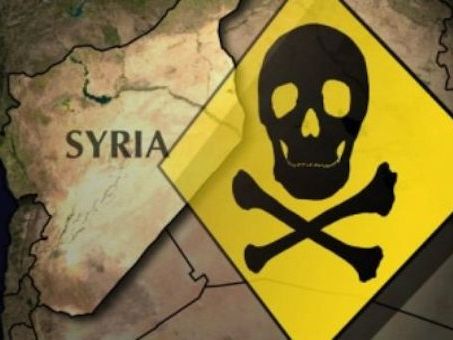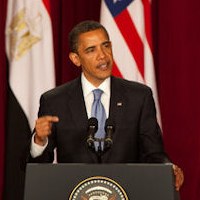![]()
Tue, August 27, 2013 | RubinReports | By Barry Rubin
It’s really pretty simple. The American people understandably don’t want to go to war with Syria — not to mention with Syria’s patron, Iran — and especially not for the goal of putting the Muslim Brotherhood and murderous Islamists into power there. Going to war is a serious matter to say the least. There’s no assurance how long it will take, how many lives it will cost, and what turns it may take. And the Middle East has just had several examples of these wars.
Iraq and Afghanistan cost a lot of money and lives as they extended for a much longer time than had been expected. In addition, they derailed the Bush administration’s electoral fortunes and domestic programs. With the main emphasis of the Obama administration being a fundamental transformation of America, such distractions are not desired.
There is one other important consideration: the Obama administration does not accept the traditional diplomatic and great power strategies. It believes that it can reconcile with Islamist states, it does not comprehend deterrents, it does not keep faith with allies, and it does not believe in credibility, the belief that only power exerted can convince a foe of seriousness.
Of course, that wouldn’t rule out a one-time targeted attack but even if that were to be done, is America going to fight a full-scale war on the ground with allies — including al-Qaida — which will never be satisfied and will always be eager to stab them in the back?
The administration has trapped itself with two problems. One is that the rebels who are being supported in Syria are extreme radicals who may set off blood baths and regional instability if they win. The other is that a challenge has been given to very reckless forces: Iran, Syria, and Hizballah. When the United States threatens these three players the response is “make my day!”
So this is the situation and the Obama administration is bluffing.
It does not want to exert force and probably won’t. Iran and Syria would be quite willing to fight a war, but the United States — people and government — do not have the will to do so.
What is the best option for the Obama administration? To try to negotiate — as unlikely as it is — a deal in which some kind of interim or coalition arrangement would be arranged with Russia and Iran to make a transition from the current regime. Mainly, this means a stalling tactic. This could work, though, if the regime does not actually win the war. Aid to rebels and some gimmicks perhaps, but no decisive action.
There is, however, still a problem — the two Syrian sides want to wipe each other out.
Why should the Russians and Iranians make a deal if they have a winning hand? No diplomatic arrangement is possible. In fact, the diplomatic option is fictional. To put it flatly, there is no alternative.
It is not inconceivable that the White House would consider easing sanctions on the Iranian nuclear program to have a chance in Syria. What is likely then is stalling, with the probability that the civil war will settle into stagnation for several years and thus a de facto partition of Syria.
The United States simply can’t win given what it is willing to do. And in a great power standoff, that’s a very dangerous situation. Remember, though: Iran cannot be said to have won as long as the civil war is continuing. The administration can simply depend on denial, which should be sufficient for domestic purposes.
Finally, ask yourself one question: Will the United States under Obama dare a confrontation with Iran, Syria, and Russia to keep up American credibility, deterrence, and the confidence of allies who it is already opposing on Egypt? Of course not.
This is already a president who could barely decide to kill Usama bin Ladin.
Barry Rubin is director of the Global Research in International Affairs (GLORIA) Center and editor of the Middle East Review of International Affairs (MERIA) Journal. His next book, “Nazis, Islamists and the Making of the Modern Middle East,” written with Wolfgang G. Schwanitz, will be published by Yale University Press in January 2014. His latest book is “Israel: An Introduction,” also published by Yale. Thirteen of his books can be read and downloaded for free at the website of the GLORIA Center including “The Arab States and the Palestine Conflict,” “The Long War for Freedom: The Arab Struggle for Democracy in the Middle East” and “The Truth About Syria.” His blog is Rubin Reports. His original articles are published at PJMedia.



 RSS
RSS











Latest Comments
Hello Mike, Thank you for your positive feedback to the article. I felt there wasn’t too much critical analysis of ...
Thanks for this considered and well constructed article. A follow up article on the manner in which the editorial contro...
THE CLUELESSNESS OF CLAIMING THAT OBAMA'S MIDDLE EAST POLICIES WERE A FAILURE CANNOT BE FURTHER FROM THE TRUTH, WHAT THE...
As long as Obama is the president of the usa do not trust the us government......
Thank you for an good read....